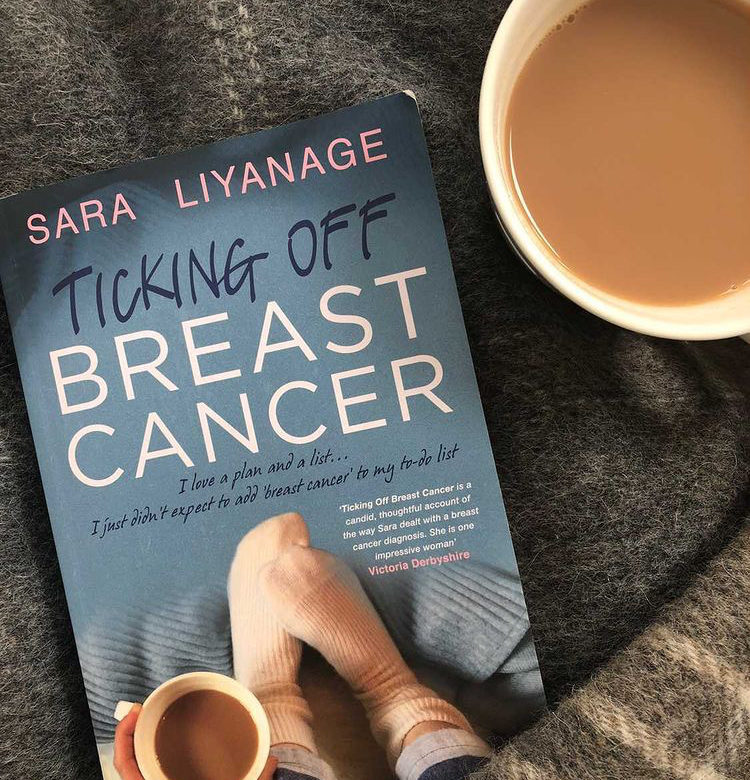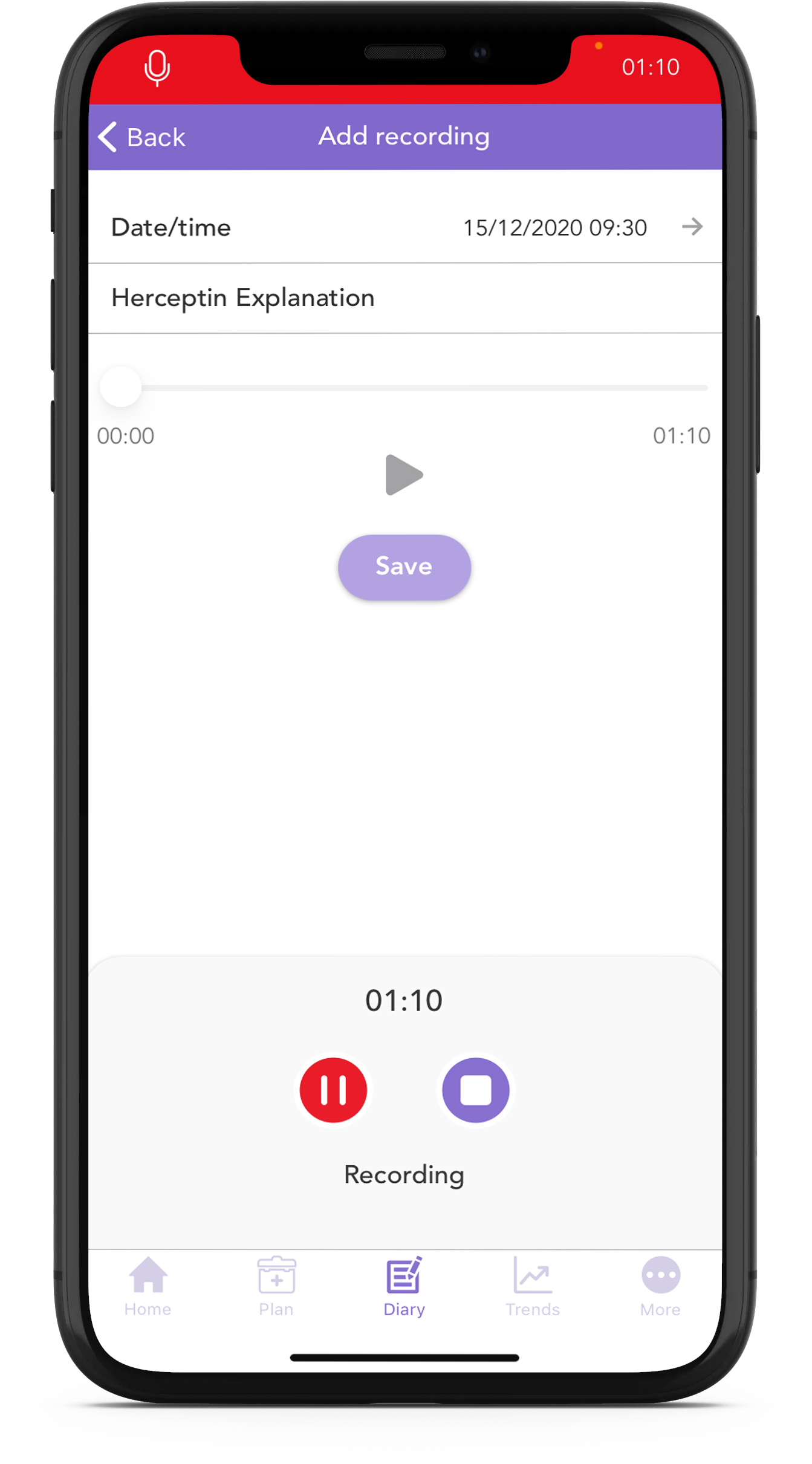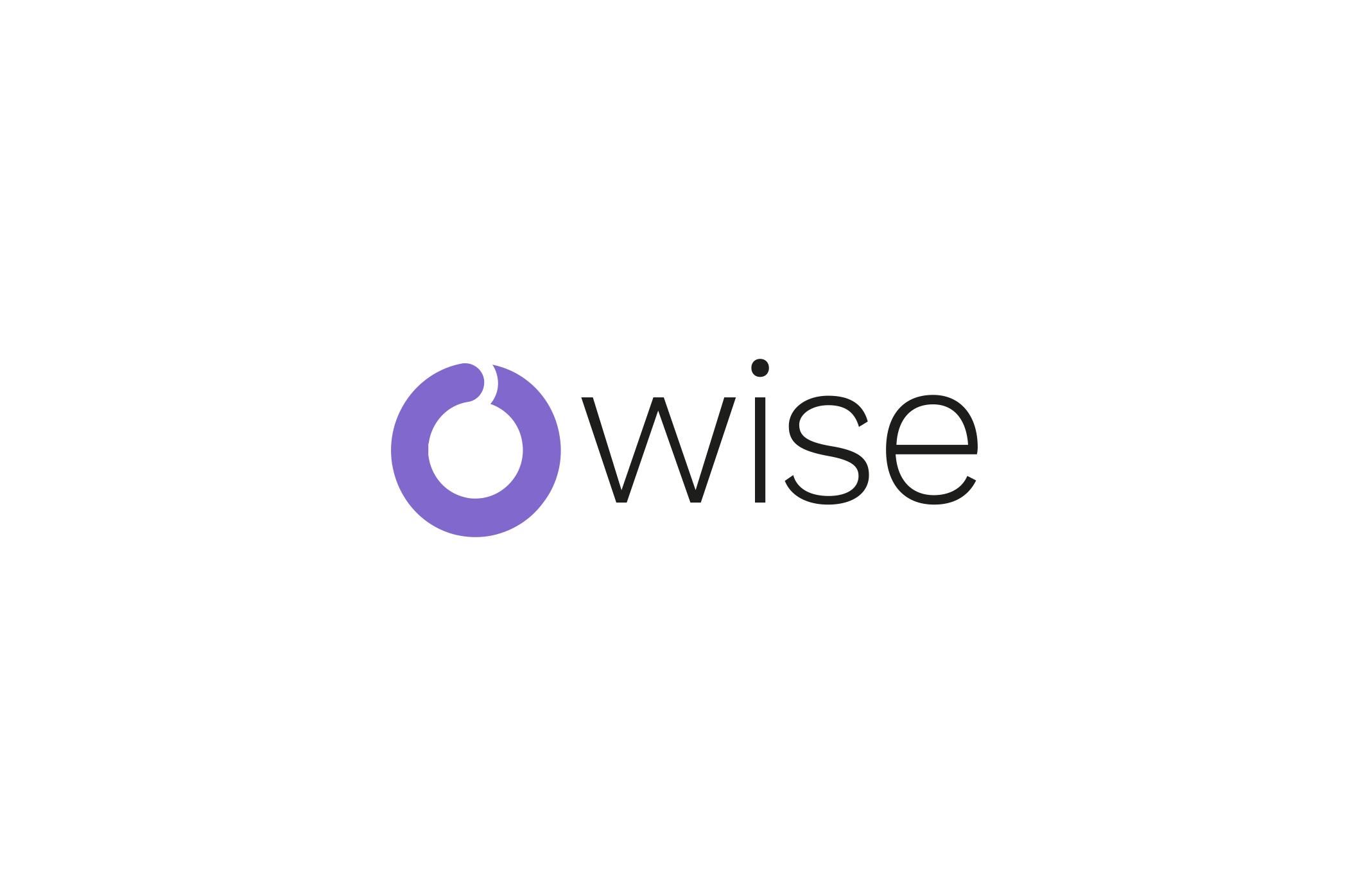
Tell us a little bit about yourself
I was diagnosed with primary breast when I was 42. My treatment involved surgery, chemotherapy, radiotherapy, Herceptin® and now I’m on tamoxifen.
Before I had breast cancer, I worked four days a week in London, so I was commuting backwards and forwards and looking after my two children at the same time. It was a very busy period of my life. Any 40-something working mother will tell you that you’re rushing here, there and everywhere. So finding time to have breast cancer was very hard. In fact, it was incredibly overwhelming to add something like that to the to-do list!
Can you tell us about your book “Ticking off Breast Cancer”?
Writing about what I had been through with breast cancer really helped me to deal with my anxiety and my mental health. It helped me so much that I ended up writing a whole book! It was so therapeutic to get it all out of my head. Also, I knew it was going to be helpful to people who were going through cancer as the book is written to give them a heads up in a gentle yet honest way.
If someone reads the book, they can see the story of someone who has gone through treatment with a similar experience to them. In that way, they know what to expect, and they know that they’re not alone – they’re not the only ones going through this.
The book isn’t just for people who’ve been diagnosed either. Cancer isn’t really talked about unless you or someone you know receives a diagnosis. Everyone’s scared of getting it, and because 1 in 7 women are going to get breast cancer at some stage, you’d rather not acknowledge or talk about it. But I think that because of these statistics, everyone should be prepared to know what to say and do when someone around them has cancer.
I think anyone could read it and find some value in there, either for themselves or for those they’re looking after, whether that’s a friend or a family member.
What advice do you have for someone who has recently been diagnosed with breast cancer?
When you are diagnosed with cancer, you are a complete novice and you don’t know at all what you’re doing. I felt inclined to read more than what my doctors or my nurses were telling me. But my advice would be to only read what you want to read. Don’t feel any pressure to absorb more than you’re comfortable with.
On the one hand, there are people who will read everything they can get their hands on, they’ll even read through research papers or clinical trials or even statistics. On the other end of the spectrum, you have people who are so overwhelmed and in shock that it’s just impossible for them to look at anything because they’re scared of what they might learn. Most people are somewhere in the middle, but both sides are valid responses.
However, if you are looking for more information, I would say not just to focus on the big charities and organisations. There are a lot of places out there that can be incredibly helpful, whether it’s advice, support or even products and services.
Why do you choose to shine the spotlight on the smaller organisations and charities out there?
When I focused originally on the well-known key charities and their websites, I found that they were overwhelming (albeit that they provided excellent information). Over time I started to come across other helpful resources. For example, when I had surgery for breast cancer, I had all my lymph nodes removed. This procedure involves having a drain for a few days to a week after your surgery, so that the lymph can drain out of this tube into a bag – and this bag is just sort of hanging! You can walk around holding it, or you can put it in a bag over your shoulder. There is a web owner who has set up something called Drain Dollies, which are bags that are specially designed with the right size to put over your shoulder.
You can find all these amazing things out there, designed by individuals, charities and non-profit organisations that no one tells you about. I felt that it needed to be put out there in a way that would allow people to easily find them. Within my page, there are links to all these organisations, and I also do guest blogs with people to see how these ideas came about.
I created the website that I’d wanted when I was diagnosed. Directing people from my website to places that I feel are genuinely going to help them and give them something they will benefit them while they’re going through treatment … that’s exactly what I wanted! I wanted someone to hold my hand and say, “this is what you need to know”.
How do things change once your active treatment comes to an end?
People like me with no evidence of disease, with no remaining cancer, manage to get back on with our lives. But we’re doing it in a way where perhaps we don’t say “no” as much and we start taking more opportunities for ourselves. I realised that once you face your mortality, you understand that everyone is going to die at some stage, and it’s really important to live your life in a way that makes you happy and fulfilled. For example, you might have been nervous about going on an adventure before, but now you’re thinking, “What have I got to lose!” You have this kind of renewed vigour.
However, there is that balance and it isn’t an immediate transition. The liberation is tempered often by some kind of fear, possibly about the recurrence of breast cancer or being diagnosed with secondary breast cancer. Over time, I’ve gradually gained more control over my fear with strategies like mindfulness, meditation, exercising, eating well and generally looking after myself. Beyond these, everyone has their own strategies for coping with their fears; mine was writing.
Eventually you do go back to normal – it’s not all holidays and adventures! But I do have more of an appetite for things that I wouldn’t necessarily have done before. You begin to look at things in a different way.
You mentioned how writing can help people to overcome a sense of fear. Can you tell us more about that?
I really want to encourage people to share their experience by writing it out, because I do believe it’s a huge therapy. I try to share peoples’ experiences as best I can with others who would benefit from reading about it. This is a really important part of the website, a platform for people to share their story. These are just everyday people like you and me who have been through something, who just want to share their story.
Some people will just write about how they felt generally throughout their diagnosis, treatment and beyond, whereas others will talk more about a specific aspect. For example, someone shared a story with me about how they were still breastfeeding when they were diagnosed, this part of her story was something that she particularly wanted to flag up.
There are so many people who don’t necessarily have their own platform for their voice, yet they have something really important to say. The website is for everyone and the more diverse the stories I can get on it, the better. No matter what you’ve been through with breast cancer, if you want to write about it and share it with people, the website is there for you.
And there are benefits for both the writer and the reader. The reader might feel less alone after reading this story that’s so similar to theirs, while the writer gets something off their chest and gets the validation from the reader. They want to be heard, and I think we all want to be heard, don’t we? Especially when we’ve been through something so awful and traumatic as this.
Given that the pandemic is still affecting people and their experience of treatment, how do you think the OWise breast cancer app can help?
Before, when you had your treatment plan, it was much more set in stone, whereas now I think it’s more uncertain whether or not that plan will be followed to the letter. Currently, more than ever, you need to feel more in control of what’s going on.
It’s not the same as when I was having chemotherapy. At my hospital, if I had a question or had a particular issue, I could easily pop into the chemotherapy ward and get my answer. You can’t necessarily do that now so you need to be even more on top of what’s going on. I think the app is a good way of keeping track of your cancer treatment, so that you are overseeing everything yourself.
When you go through treatment, there are so many different strands to the web; your surgeons, your oncologist, your chemotherapy nurses, your radiotherapy nurses. In the pandemic those connections could get jumbled up or lost. If you’re recording everything within the app, then you can take more responsibility for these things. It is important that you don’t always have to rely on what is, sometimes, an imperfect system.
Finally, it’s important to remember that you can’t take people to appointments with you these days. When I was going through treatment, my husband kept notes of everything and made sure it was all recorded. He wouldn’t be able to do that if that was happening now, so it’s more down to the patient.
The app means you can record everything and not have to worry about misplacing the information. You know where it is and you know it’s safe.
Sarah is the creator of “Ticking Off Breast Cancer”. To learn more about her book and her work online, check out her website here.

Keeping track of all the different moving parts of cancer treatment can be difficult, especially if your appointments are few and far between and if you can’t bring someone along to remind you of all the details. With the OWise breast cancer app, you can feel secure in the fact that all your information is recorded and stored in one place. For example, using our app you can make audio recordings of your appointments – once you receive permission from your doctor. You can then listen to this at a later stage in case you forget a detail or if you simply wish to review the conversation. Download the FREE app today!
